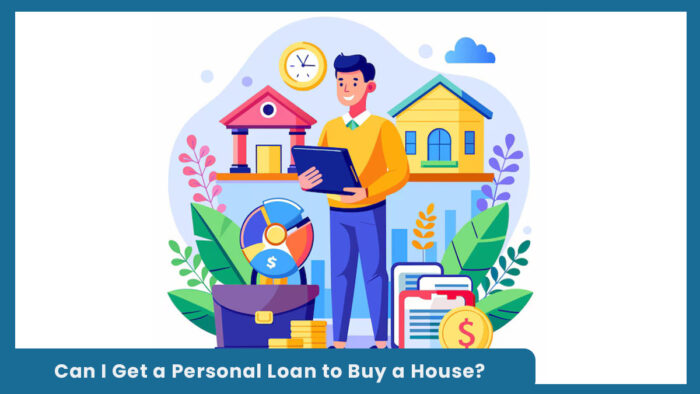Can I Get a Personal Loan to Buy a House – Personal loan amounts range from $1,000 to $100,000. While that may not be enough to buy a typical home, it could work if you’re purchasing a tiny or manufactured home

Interest paid on a personal loan is not tax-deductible like mortgage interest.You can usually get funds faster with a personal loan than a traditional mortgage.
With the median sale price of a home in early 2025 sitting at $396,900, most personal loans won’t provide enough to buy a traditional house. However, if you’re aiming to purchase a tiny home or a mobile home, a personal loan could be a good fit. Even if you don’t use it to buy a home outright, it could help strengthen your finances to qualify for a mortgage.
Can You Use a Personal Loan to Buy a House?
Yes, you can, but only if the home’s price falls within personal loan limits and you’re comfortable with the repayment terms. This might not work for a standard home, but it’s often ideal for smaller, more affordable housing options.
How to Buy A Tiny Home With Personal Loan
Tiny homes often cost between $20,000 and $60,000. Since many mortgage lenders avoid loans under $100,000 or properties that don’t meet minimum size standards, a personal loan can be a practical solution.
Because personal loans are usually unsecured, there’s no risk of losing your home if you can’t make payments. But unlike a mortgage, you won’t be able to deduct the interest from your taxes.
Financing a Manufactured Home
The average cost of a manufactured home is about $127,250. While this may exceed the upper limit of some personal loans, homes at the lower end of the range could qualify. If your manufactured home isn’t fixed to land you own, you may not qualify for a mortgage, making a personal loan a better option.
This type of loan may also be less expensive than a chattel loan, which is commonly used for mobile homes but tends to have higher rates.
Six Ways to Use a Personal Loan Toward HomeownerXship
- Pay off high-interest credit card balances to reduce your total debt.
- Improve your chances of a lower mortgage rate or better closing terms.
- Refinance expensive loans to improve your debt-to-income ratio.
- Boost your savings by using the loan to free up monthly cash.
- Take out a secured personal loan and use the funds toward a down payment.
- Use a personal loan to make an all-cash offer on a low-cost home.
Pros and Cons of Using a Personal Loan for Homeownership
Personal loans can offer a quick and flexible way to finance a home, especially for tiny or manufactured houses that may not qualify for traditional mortgages.
However, while they may seem like a convenient option, personal loans come with their own set of advantages and drawbacks. Understanding both sides can help you decide if this path is right for your homeownership goals.
Pros
- Consolidates multiple debts into one monthly payment.
- Can improve your credit score by reducing credit card balances.
- Often does not require collateral.
- Usually faster to fund than traditional mortgage loans.
- May help you save for a down payment.
Cons
- Could increase your debt-to-income ratio.
- Interest rates tend to be higher than home equity loans or HELOCs.
- Shorter loan terms lead to higher monthly payments.
- Some lenders charge origination fees or early payoff penalties.
- Interest is not tax-deductible for home purchases.
Can You Use a Personal Loan for a Down Payment?
Not if the loan is unsecured. However, if the personal loan is backed by an asset like a car, collectible, or other personal property some lenders may allow you to count those funds toward your down payment. You’ll need to show proof of ownership and demonstrate you can manage the added monthly payment.
Final Thoughts
There are several ways to use a personal loan when buying a home, especially if you’re looking at less expensive options like tiny or manufactured homes. A personal loan can also help clean up your credit profile and make you more eligible for a mortgage in the future.
Before taking that step, compare loan options, review repayment terms, and consider how the loan fits with your overall financial goals. The right strategy can help move you closer to becoming a homeowner.



